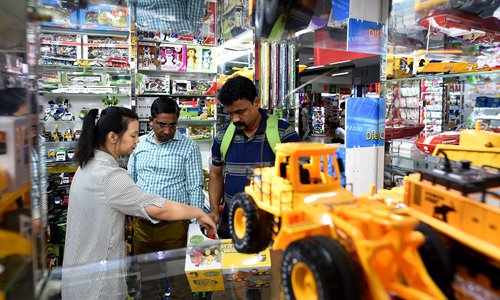
Customers from India choose products at a wholesale market in Yiwu, East China's Zhejiang Province. File photo: VCG
Under the most optimistic scenario, China's economic activity will fully rebound in the second half of the year, as vigilance against imported coronavirus infections has complicated arrangements to get the economy quickly back in motion.
The coronavirus pandemic is inflicting global damage in both health and economic terms, intensifying downward pressure on China's economic revival push, said Bai Ming, deputy director of the Ministry of Commerce's International Market Research Institute.
With no new infections reported on Wednesday in Wuhan, Central China's Hubei Province where the virus was initially diagnosed, the Chinese mainland cut its domestic transmission tally to zero. But the nation reported 34 imported cases on Wednesday.
With the pandemic becoming a global public health crisis, recommencing work and production is not only about getting domestic factories humming again, Bai told the Global Times on Thursday.
There are different levels of resumption, meaning that while some parts of a supply chain are up and running, other parts might still be held back, he said, noting that tremendous uncertainty over the coronavirus response outside of China is animating fears of a global recession.
"We have resumed 80 percent of our total production so far, while some firms along the supply chains have yet to recover, impeding a full recovery of our production ability," said the owner of a toy manufacturer based in Yiwu, East China's Zhejiang Province who gave his surname as Zhang.
Many orders from markets such as South Korea are being delayed or even cancelled during the outbreak, he told the Global Times.
Economic sluggishness in the rest of the globe would inevitably weigh on China's economic reboot, according to Bai, who said that activity in the world's second-largest economy might not rebound to pre-epidemic levels until the second half.
Takeaways from a recent Essence Securities conference call showed that work resumption in China had steadily proceeded before trending down more recently due the viral outbreak in overseas markets.
The brokerage estimated the economic activity of South China's Guangdong Province would fully rebound to normal levels by the end of March, but that scenario seems unlikely now. It won't be until at least April or May that the province's economy will get back to normal and a nationwide recovery is unlikely before May.
The delayed work resumption seems to be exacerbating downward pressure on the economy, which posted the worst slumps on record in retail sales, fixed-asset investment and industrial output in the first two months, drawing attention to efforts to restart the stalled economy.
Party committees and governments at all levels should feel a sense of urgency to establish an economic and social order that is compatible with epidemic prevention and control. Efforts are required to actively push companies and institutions to restart work and production in an orderly manner so as to minimize coronavirus-inflicted losses, according to a leadership meeting on epidemic prevention and control on Wednesday, the Xinhua News Agency reported.
Wuhan will push for the resumption of work and production while the rest of Central China's Hubei Province is set to remove controls in an orderly manner. More places have been easing restrictions. For example, East China's Anhui Province on Wednesday scrapped closed-off rules for residential communities.
"We've resumed all our production so far, with all employees back at work," Jack Wang, owner of an auto components producer in Nantong, East China's Jiangsu Province, told the Global Times on Thursday.
Wang said the local authority has waived social security contributions for small and medium-sized firms until June to ease their financial burdens.
Wang said the company has been running well since it resumed operations on February 18, making it among the earliest batch of firms to resume production in the city.
The main concern now is an expected decline in overseas orders, a source close to the Yiwu government told the Global Times on Thursday.
The local government's woes echo the aches of export-oriented businesses. The Ministry of Commerce said on Thursday that the spread of the virus globally has hit some countries and regions on the production and consumption fronts and reduced trade.
The ministry said it expected exporters might encounter sluggish overseas demand and reduced orders.
Zhang, whose toy facility sells to markets in Europe, South Korea and Japan, predicted at least a 50 percent drop in overseas orders.
In the case of Wang, orders for his auto components company are just a fraction of the year-earlier level, and the global virus outbreak may push up prices of raw materials it imports from various countries in Europe, as many have halted production due to the pandemic.




